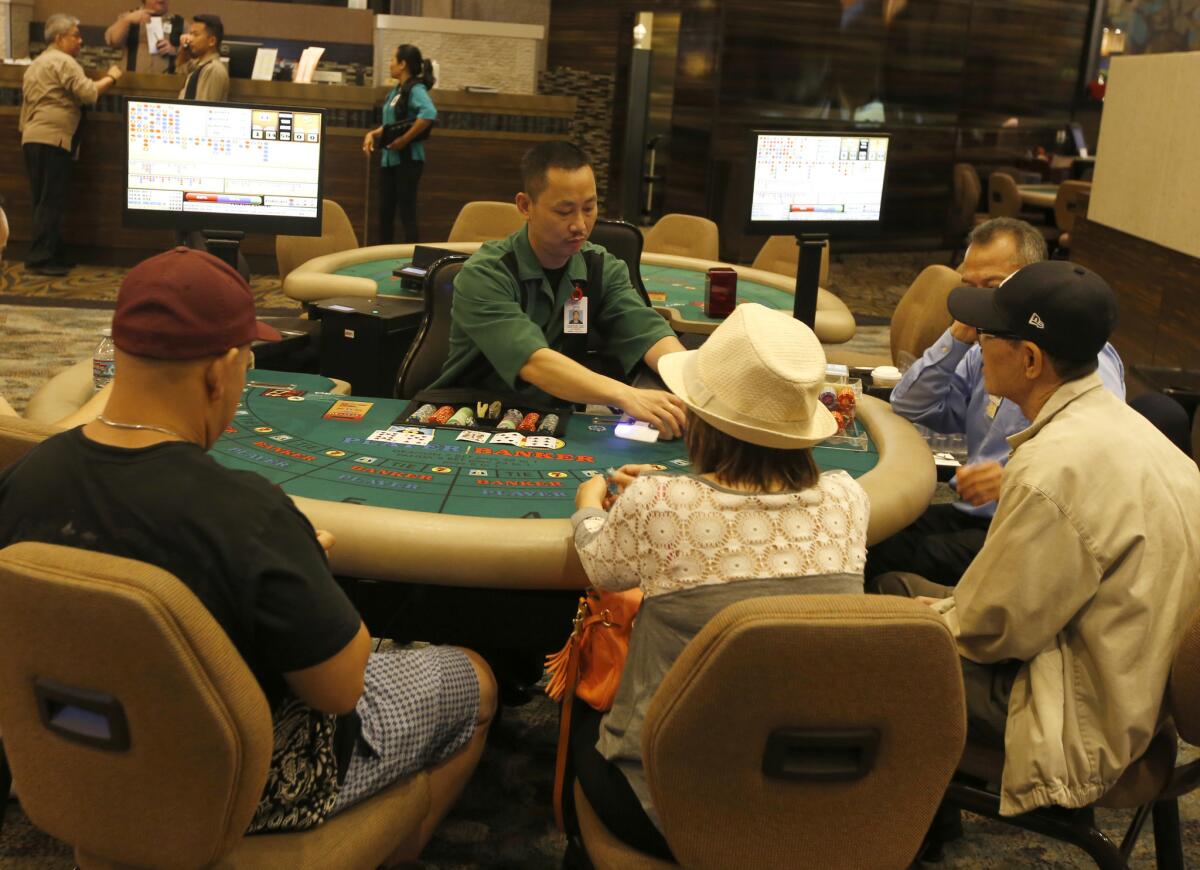New state gambling rules would ‘kill’ card rooms, some worry

- Share via
The state Bureau of Gambling Control has proposed new rules for California’s 72 card rooms that operators of the establishments say could make games such as seven card stud poker, pai gow and baccarat more complicated and a lot less fun.
The tentative rules follow a year of hearings on card rooms held by the state’s gambling control commission. But card room operators say the proposed rules could make gambling in places such as the Bicycle Hotel and Casino in Bell Gardens and the Hustler Casino in Gardena so onerous and complicated that gamblers may abandon them for casinos in Las Vegas or on tribal lands, where the rules do not apply.
“If these regulations were adopted as proposed, they would kill the card room industry and devastate dozens of communities and thousands of working California families across the state,” the California Gaming Assn., a trade group for the state’s card rooms, said in a statement. “This proposal is a clear attack on the card room industry and a message that the bureau is intent on eliminating this lawful $5.6-billion industry and putting 32,000 Californians out of work.”
In traditional casinos in Las Vegas and on Native American lands, players at a card table try to win money from the casino, which is represented by the dealer who also acts as the banker. In California, state law prohibits card rooms not located on tribal lands from having any financial stake in the outcome of the games.
So at most card rooms, an employee acts as the dealer and a representative from a licensed third-party business takes on the role of banker, also known as “the house.” The banker collects from the losers and pays the winners. Card rooms generate revenue by collecting a fee from each player during each hand. The fee is based on the bet limit at each table.
Under the tentative state rules, all players at the table would be required to take turns serving as the banker, switching every two rounds. Players who refuse would be excluded from the game. If no one accepts the role of banker, the game stops, according to the proposed rules.
Most card games in the state’s card rooms require a banker. Card room owners and longtime players say gamblers typically don’t want to take on the extra work of being the banker and say rotating the position slows down the game. Things could get confusing, they say, if a novice player with a weak grasp of the rules becomes the banker.
The bureau released the proposed rules Tuesday to card room operators and other industry insiders, saying the agency’s commission will consider testimony on the changes during a hearing Dec. 18 in Sacramento. When asked why the agency proposed the rules, the bureau issued a statement saying that the state Department of Justice is “looking at various issues related to gaming and is interested in receiving input and engagement from the public.”
A study commissioned by the California Gaming Assn. estimated that card rooms in Los Angeles County generated $2.3 billion in economic impact, about $71 million in local taxes and support nearly 13,500 jobs. The report released in October estimated that card rooms statewide generated $1.64 billion in wages and benefits for more than 32,000 jobs, with about $500 million in state and local taxes.
Card rooms operate in some of the state’s poorest cities, generating up to 70% of local tax revenue for cities such as Commerce and Hawaiian Gardens.
“It’s going to devastate a lot of working-class communities, not just the city of Commerce,” said Edgar Cisneros, city manager of Commerce, where the 240-table Commerce Casino generates about 45% of the city’s tax revenue.
The bureau began holding hearings a year ago on new card room regulations, but bureau commission members were tight-lipped about what rules they were considering. At the time, card room operators accused the bureau of pushing new regulations at the behest of Native American casinos, the main rivals of the state’s card rooms.
In a statement, Steven Stallings, chairman of the California Nations Indian Gaming Assn., said the organization had no comment on the proposed rules, adding: “While we are still studying the proposed regulations, we are generally in support of regulatory agencies taking a clear position on illegal gaming practices.”
More to Read
Inside the business of entertainment
The Wide Shot brings you news, analysis and insights on everything from streaming wars to production — and what it all means for the future.
You may occasionally receive promotional content from the Los Angeles Times.











